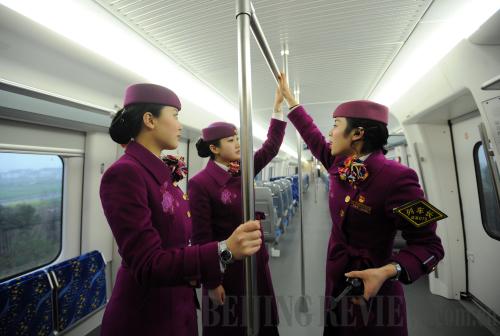|
 |
|
TRAINING DAY: Crew members receive safety tips on a brand new inter-city CRH6 bullet train, which has a maximum speed of 200 km per hour. The train made a no-load run between Chengdu and Dujiangyan, two cities in Sichuan Province on February 10 before being put into operation (XUE YUBIN) |
License Approved
Suning, one of China's largest appliance retailers, announced on February 7 that it has obtained an international express delivery license from the State Post Bureau, becoming the country's first e-commerce player to operate the service.
The move will enable the Nanjing-based company to expand the overseas market for its online retailing business while competing with FedEx, DHL, UPS and TNT in international express delivery service.
Before the announcement, Suning had already obtained a national license and more than 150 regional licenses for its express delivery services around the country.
It has become common practice for online shopping platforms to enter the logistics market. Jingdong Mall became China's first e-commerce company to obtain an express delivery license in 2012, and other online retailing platforms such as Vancl, Vipshop and Yihaodian followed suit in applying.
Anti-trust Probe
U.S. patent licensing company InterDigital Inc. promised to work with China's anti-trust authorities in the hope that the latter will suspend its ongoing investigation into the firm.
The anti-monopoly bureau under the National Development and Reform Commission (NDRC) confirmed on February 10 that it has received a commitment request from InterDigital that could form the predicate for the suspension of the anti-monopoly investigation.
The NDRC said it will further study the case before making any decisions.
InterDigital has allegedly charged Chinese telecom firms like Huawei and ZTE higher patent royalty rates than it got from Apple Inc. and Samsung Electronics. It is also suspected of using unfair trade practices to force Chinese companies to accept the offer.
In last October, a court in south China's Guangdong Province ordered InterDigital to pay Huawei 20 million yuan ($3.28 million) in compensation for monopolistic practices.
InterDigital said it will continue to cooperate with the investigation and work with the NDRC to resolve any remaining concerns.
Under China's anti-monopoly laws, fines for a company found violating the rules and refusing to cooperate range from 1 percent to 10 percent of its total revenue in the previous year. | 